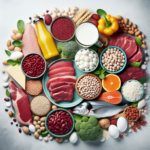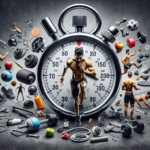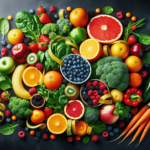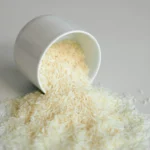Are you unsure about which diet is best for your fitness goals? With so many options available, it can be overwhelming to determine which one suits you best. Whether you want to lose weight, build muscle, or improve your overall health, finding the right diet is essential. In this article, we will explore different types of diets and provide you with key information to help you make an informed decision about the best diet for your fitness goals.
In This Article
ToggleImportance of Diet in Achieving Fitness Goals
When it comes to achieving your fitness goals, whether it’s losing weight, building muscle, improving endurance, or enhancing overall health and well-being, diet plays a crucial role. Your diet not only affects your energy levels and performance during workouts but also plays a vital role in muscle growth and recovery. By understanding the correlation between diet and fitness, you can make informed decisions about the types of diets that are best suited to help you reach your specific goals.
Understanding the correlation between diet and fitness
Your diet and fitness are closely intertwined. What you eat directly impacts your body’s ability to perform at its best and achieve optimal results. Properly fueling your body with the right nutrients can enhance your workout performance, boost your energy levels, and facilitate muscle growth and recovery. On the other hand, neglecting your diet can lead to fatigue, decreased performance, and hindered progress towards your fitness goals.
The impact of diet on energy levels and performance
Eating a well-balanced diet that provides an adequate amount of calories, macronutrients, and micronutrients is essential for maintaining optimal energy levels and achieving peak performance during your workouts. Carbohydrates, for example, are the primary source of energy for your body and play a crucial role in fueling intense exercise and endurance activities. Including enough carbohydrates in your diet can help prevent fatigue and sustain high levels of performance.
Additionally, proper hydration is key to maintaining energy levels and optimizing performance. Dehydration can lead to decreased endurance, cognitive function, and overall performance. It is important to consume enough fluids throughout the day, especially before, during, and after workouts, to ensure proper hydration and electrolyte balance.
How diet affects muscle growth and recovery
If muscle growth is one of your fitness goals, then your diet becomes even more critical. Adequate protein intake is essential for muscle repair and growth. Protein provides the building blocks (amino acids) necessary for muscle tissue synthesis, and without sufficient protein, it becomes challenging for your body to repair and build new muscle fibers.
In addition to protein, carbohydrates also play a crucial role in muscle growth. When you engage in strength training exercises, your body relies on glycogen stores in the muscles for fuel. By consuming enough carbohydrates, you replenish these stores, ensuring that your muscles have the necessary energy to perform and recover.
It’s worth noting that the timing of your meals also plays a role in muscle recovery. Consuming a protein-rich meal or snack within the first hour or two after your workout can support muscle repair and enhance recovery. This is often referred to as the “anabolic window”.

Key Factors to Consider
Before jumping into a specific diet plan, it’s important to consider several key factors that can help guide your choices. These factors include your body composition goals, activity level and exercise routine, as well as any dietary restrictions or preferences you may have.
Body composition goals
Considering your body composition goals is crucial in determining the right diet for you. If your goal is to lose weight and decrease body fat percentage, you may benefit from a calorie-restricted diet that creates a calorie deficit. On the other hand, if your goal is to build muscle and increase strength, you may require a diet with a higher protein intake.
Activity level and exercise routine
Your level of physical activity and the type of exercises you engage in also play a significant role in determining your dietary requirements. Athletes or individuals with high activity levels may require more calories and macronutrients to support their training and recovery needs. Understanding your energy expenditure and adjusting your diet accordingly can help optimize your performance.
Dietary restrictions and preferences
It’s important to consider any dietary restrictions or preferences you may have when choosing a diet plan. Whether you follow a specific eating pattern due to religious, ethical, or health reasons, finding a diet that aligns with your beliefs and suits your needs can contribute to a sustainable and enjoyable fitness journey.
Different Types of Diets
There are numerous types of diets that people follow to achieve their fitness goals. Each diet has its own unique approach and focuses on certain macronutrients or food groups. Let’s explore some popular types of diets that individuals use to support their fitness goals.
1. Calorie-restricted diets
Calorie-restricted diets involve consuming fewer calories than your body needs to create a calorie deficit, resulting in weight loss. These diets often involve portion control, tracking calorie intake, and focusing on nutrient-dense foods to ensure you get proper nutrition while reducing overall energy intake.
2. High-protein diets
High-protein diets place an emphasis on consuming a significant amount of protein to support muscle growth and repair. These diets are popular among individuals who are looking to build muscle, and often involve incorporating lean meats, poultry, fish, eggs, dairy products, legumes, and plant-based protein sources into their meals.
3. Low-carb or ketogenic diets
Low-carb or ketogenic diets involve restricting carbohydrate intake and increasing fat consumption to encourage the body to enter a state of ketosis, where it primarily relies on fat for fuel. These diets can be effective for weight loss and are often preferred by individuals who are insulin resistant or have difficulty metabolizing carbohydrates.
4. Plant-based or vegetarian diets
Plant-based diets focus on consuming predominantly plant-based foods while limiting or eliminating animal products. Vegetarian diets eliminate meat and seafood, while vegan diets exclude all animal-derived products, including dairy, eggs, and honey. These diets are often chosen for ethical, environmental, or health reasons.
5. Mediterranean diet
The Mediterranean diet is based on the traditional eating patterns of countries bordering the Mediterranean Sea. It emphasizes whole grains, fruits, vegetables, legumes, healthy fats like olive oil, moderate amounts of lean proteins such as fish and poultry, and limited intake of red meat and processed foods. This diet is associated with various health benefits, including improved heart health and reduced risk of chronic diseases.
6. Intermittent fasting
Intermittent fasting involves alternating periods of fasting and eating. Common methods include the 16/8 method, where you fast for 16 hours and eat within an 8-hour window, or the 5:2 method, where you eat normally for five days and restrict calorie intake for two non-consecutive days. Intermittent fasting can aid in weight loss and provide other potential health benefits.
7. Flexible dieting or If It Fits Your Macros (IIFYM)
Flexible dieting, also known as If It Fits Your Macros (IIFYM), revolves around tracking macronutrients (carbohydrates, proteins, and fats) rather than focusing on specific foods. This approach allows flexibility in food choices as long as your overall macronutrient targets are met. Flexible dieting can be effective for those who prefer freedom in their food choices while still adhering to their desired macronutrient ratios.
8. Whole foods diet
A whole foods diet involves consuming minimally processed or unprocessed foods that are as close to their natural state as possible. This diet emphasizes whole grains, fruits, vegetables, lean proteins, and healthy fats. By avoiding processed foods and added sugars, individuals can benefit from a diet rich in essential nutrients and phytochemicals while minimizing empty calories.
Choosing the Right Diet for Muscle Gain
If your fitness goal is to build muscle and increase strength, choosing the right diet is crucial. Here are some factors to consider when selecting a diet plan to support muscle gain:
Importance of adequate protein intake
Protein is the key nutrient for muscle repair and growth. To promote muscle synthesis, it is recommended to consume approximately 1.6 to 2.2 grams of protein per kilogram of body weight per day. This can be achieved by incorporating lean meats, poultry, fish, eggs, dairy products, legumes, and plant-based protein sources into your meals.
Impact of carbohydrates on muscle growth
Carbohydrates are essential for fueling intense workouts and replenishing glycogen stores in your muscles. Including an adequate amount of carbohydrates in your diet can ensure that your muscles have the necessary energy to perform and recover. Opt for complex carbohydrates such as whole grains, fruits, vegetables, and legumes to provide sustained energy.
Dietary considerations for muscle recovery
Muscle recovery is as important as muscle growth when it comes to achieving your fitness goals. Make sure to consume a post-workout meal or snack that includes protein and carbohydrates within the first hour or two after your workout. This promotes muscle repair and glycogen replenishment, aiding in recovery and optimizing your results.
Choosing the Right Diet for Weight Loss
If your fitness goal is to lose weight, incorporating the right diet is crucial for creating a calorie deficit. Here are some factors to consider when choosing a diet plan for weight loss:
Creating a calorie deficit
Weight loss is achieved by creating a calorie deficit, which means consuming fewer calories than your body needs. This deficit can be achieved through a combination of reducing calorie intake and increasing physical activity. It’s important to find a balance that allows for gradual and sustainable weight loss.
Effectiveness of low-carb and ketogenic diets
Low-carb and ketogenic diets have gained popularity for weight loss due to their ability to promote fat burning. By limiting carbohydrate intake and increasing fat consumption, these diets can help induce a state of ketosis, where the body primarily relies on fat for fuel. However, it’s important to consult with a healthcare professional before starting any drastic dietary changes.
Balancing macronutrients for sustainable weight loss
While creating a calorie deficit is necessary for weight loss, it’s also important to ensure that you are getting a well-balanced diet with essential macronutrients. Incorporating lean proteins, complex carbohydrates, and healthy fats into your meals can help you feel satiated, maintain muscle mass, and support sustainable weight loss.
Diet for Endurance and Stamina
If your fitness goal is to improve endurance and stamina, your diet should focus on providing the necessary fuel and optimizing performance. Consider the following factors when choosing a diet for endurance:
The role of carbohydrates in fueling endurance activities
Carbohydrates are the primary fuel source for endurance activities, as they can be quickly converted into energy for your muscles. Consuming an adequate amount of carbohydrates before, during, and after endurance workouts can help maintain energy levels, delay fatigue, and enhance performance. Opt for complex carbohydrates such as whole grains, fruits, and vegetables.
Importance of hydration and electrolyte balance
Proper hydration is crucial for endurance athletes, as even mild dehydration can impair performance and increase the risk of heat-related illnesses. It is recommended to drink fluids before, during, and after workouts to maintain hydration levels. Additionally, including electrolyte-rich foods or sports drinks can help replenish minerals lost through sweat.
Dietary strategies for enhancing stamina
Incorporating specific dietary strategies can help enhance stamina and optimize performance. These strategies may include consuming caffeine before workouts to improve focus and delay fatigue, consuming foods high in nitrates (such as beetroot juice) to enhance endurance, and utilizing carbohydrate-loading techniques before long endurance events.
Diet for Strength and Power
If your fitness goal is to maximize strength and power, your diet should aim to support muscle repair and growth while providing adequate energy for intense workouts. Consider the following factors when choosing a diet for strength and power:
Focus on protein for muscle repair and growth
Protein is essential for muscle repair and growth, making it crucial for individuals focused on strength and power. Aim to consume high-quality protein sources, such as lean meats, poultry, fish, eggs, dairy products, and plant-based protein sources, to provide the necessary amino acids for muscle synthesis.
Effect of carbohydrates on strength and power performance
Carbohydrates play a vital role in providing energy for intense workouts and replenishing glycogen stores in your muscles. By consuming enough carbohydrates, you can ensure that your muscles have the necessary fuel to perform at their best during strength and power training. Opt for complex carbohydrates like whole grains, fruits, and starchy vegetables.
The role of caffeine and other ergogenic aids
Caffeine has been shown to improve strength and power performance by stimulating the central nervous system and reducing perception of effort. Incorporating caffeine, either in the form of coffee or supplements, before workouts may enhance focus, endurance, and power output. Other ergogenic aids, such as creatine monohydrate, beta-alanine, and nitric oxide boosters, may also be worth considering, but it’s important to consult with a healthcare professional before using them.
Diet for Overall Health and Well-being
Regardless of your specific fitness goals, prioritizing overall health and well-being through your diet is essential. Here are some factors to consider when choosing a diet for overall health:
Promoting a balanced and varied diet
Focus on consuming a balanced and varied diet that includes a wide range of whole foods. Incorporate fruits, vegetables, whole grains, lean proteins, and healthy fats into your meals to ensure you are getting a diverse array of nutrients and phytochemicals that support overall health and well-being.
Importance of micronutrients and phytochemicals
Micronutrients such as vitamins and minerals play a crucial role in numerous bodily functions, including energy metabolism, immune support, and cellular health. Consuming a variety of colorful fruits, vegetables, nuts, seeds, and whole grains can help ensure you are getting a wide range of micronutrients. Additionally, phytochemicals found in plant-based foods have been shown to have various health benefits and should be incorporated into your diet.
Incorporating whole foods and minimizing processed foods
Whole foods are nutrient-dense and provide a wide range of essential nutrients. They are often less processed and contain fewer additives, preservatives, and added sugars compared to processed foods. Aim to incorporate whole foods into your diet while minimizing your intake of processed foods, as this can contribute to better overall health and well-being.
Considerations for Dietary Restrictions
If you have specific dietary restrictions or preferences, it’s important to adapt your diet plan accordingly to ensure you can still achieve your fitness goals. Here are some considerations for common dietary restrictions:
Adapting diets for vegetarian or vegan individuals
A vegetarian or vegan diet can still support your fitness goals, but it requires careful planning to ensure you are meeting your nutritional needs. Make sure to incorporate a variety of plant-based protein sources, such as legumes, tofu, tempeh, seitan, and plant-based protein powders. Additionally, pay attention to your intake of key nutrients like iron, vitamin B12, and omega-3 fatty acids, which may require supplementation or careful food choices.
Diets for individuals with gluten or lactose intolerance
For individuals with gluten intolerance or celiac disease, avoiding gluten-containing grains like wheat, barley, and rye is necessary. Fortunately, there are many gluten-free alternatives available such as quinoa, rice, oats, and gluten-free bread and pasta. For individuals with lactose intolerance, choosing lactose-free dairy products or opting for alternative milk options like almond milk, soy milk, or oat milk can be a suitable choice.
Managing food allergies in the context of fitness goals
If you have food allergies, it’s crucial to avoid those specific allergens to prevent adverse reactions. An allergen-free diet plan should focus on whole, unprocessed foods that do not contain the allergen. Working with a healthcare professional or registered dietitian can help ensure you are meeting your nutritional needs while effectively managing your allergies.
Creating a Sustainable Diet Plan
Creating a sustainable diet plan is essential for long-term success and overall well-being. Here are some tips for building a diet plan that you can stick to:
Identifying long-term dietary habits
Instead of opting for short-term, restrictive diets, aim to establish long-term dietary habits that align with your goals and preferences. Consider making gradual and sustainable changes to your eating patterns, such as incorporating more whole foods, reducing portion sizes, and finding enjoyable ways to prepare and consume nutritious meals.
Setting realistic and achievable goals
Be realistic about your goals and create a diet plan that is both achievable and enjoyable. Set specific and measurable goals that take into account your current lifestyle, preferences, and any dietary restrictions you may have. Consulting with a healthcare professional or a registered dietitian can help provide personalized guidance and ensure your goals are realistic and safe.
Seeking support from professionals or a dietitian
If you are unsure how to start or feel overwhelmed by the abundance of information, consider seeking support from professionals, such as registered dietitians or nutritionists. They can provide guidance tailored to your specific needs, help you create a personalized diet plan, and offer accountability and ongoing support on your fitness journey.
In conclusion, the importance of diet in achieving fitness goals cannot be overstated. By understanding the correlation between diet and fitness, considering key factors such as body composition goals, activity level, and dietary restrictions, and selecting the right diet plan for your specific goals, you can optimize your performance, enhance muscle growth and recovery, and improve overall health and well-being. Remember to prioritize sustainability, set realistic goals, and seek professional support when needed to ensure long-term success in your fitness journey.
FAQ
1. Why is choosing the right diet important for fitness goals? Choosing the right diet is crucial as it significantly impacts your ability to achieve various fitness goals such as weight loss, muscle building, and overall health improvement.
2. How does diet affect fitness and workout performance? Diet plays a vital role in energy levels, workout performance, muscle growth, and recovery. Proper nutrition enhances workout performance and energy, while a poor diet can lead to fatigue and hindered progress.
3. What are essential dietary components for optimal workout performance? A well-balanced diet providing adequate calories, macronutrients, and micronutrients is essential. Carbohydrates are crucial for energy, especially in endurance activities.
4. How important is protein in a fitness-focused diet? Protein is critical for muscle repair and growth, providing the amino acids needed for muscle tissue synthesis.
5. What factors should be considered before choosing a diet plan? Consider your body composition goals, activity level, exercise routine, and any dietary restrictions or preferences.
6. What are some popular diets for achieving fitness goals? Popular diets include calorie-restricted, high-protein, low-carb or ketogenic, plant-based, Mediterranean, intermittent fasting, and whole foods diets.
7. What is the role of carbohydrates in fitness diets? Carbohydrates are the primary energy source for endurance activities, helping maintain energy levels and enhance performance.
8. Can vegetarian or vegan diets support fitness goals? Yes, but they require careful planning to ensure nutritional needs are met, including adequate protein and essential nutrients like iron, vitamin B12, and omega-3 fatty acids.
9. What approach should be taken for sustainable dieting? Focus on establishing long-term, sustainable dietary habits aligned with your goals and preferences, incorporating whole foods and balanced nutrition.
10. How should one balance diet for overall health and well-being? A balanced and varied diet including whole foods like fruits, vegetables, whole grains, lean proteins, and healthy fats is recommended for overall health.














No comment yet, add your voice below!